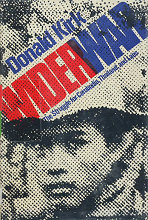
KIRK : Wider war : the struggle for Cambodia, Thailand, and Laos (fülszöveg)
"We shall avoid a wider war," said President Nixon on April 30, 1970, as he announced the U.S. intervention in Cambodia, "but we are also determined to put an end to this war." Nine months later, South Vietnamese troops, with U.S. air support, entered Laos, while Saigon also threatened to invade North Vietnam, and American planes again attacked anti-aircraft installations in the North.
The roots of today's wider war in Indochina lie deep in historical rivalries, particularly between the Thai and the Vietnamese for control of the Mekong River valley. The dissolution of French Indochina between 1945 and 1954 weakened the positions of Cambodia and Laos relative to those of Vietnam and Thailand. In the next decade, the Vietnam conflict became enmeshed in overlapping regional and great-power rivalries. Inevitably, with the search for allies, sanctuaries, and supply routes, the war has spread across the peninsula.
A Southeast Asia correspondent since 1965, Donald Kirk has ranged widely through Cambodia, Thailand, Laos, and South Vietnam. He has visited battle sites, talked with army commanders and soldiers, and interviewed scores of political leaders and officials. In this brilliant, firsthand account, Kirk relates the economic, social, political, and military situation within each country to the struggle for Indochina as a whole. He then analyzes the motivations and capabilities of the United States, North and South Vietnam, the Soviet Union, and China as they affect the prospects for peace in the region.
The fall of Cambodian Prince Norodom Sihanouk in March, 1970, continues to shock many Western observers who regarded Cambodia's long survival and internal calm as due largely to the prince's extraordinary diplomatic skill. But Kirk reveals how the prince's neglect of economic decline, internal corruption, and Communist sanctuaries eventually led to his overthrow. He details the uncertain steps toward the coup and is pessimistic about the prospects of the new republic.
Thailand, perhaps the most stable state on the peninsula, has not been immune to the conflict. North Vietnam and China train cadres for and support insurrection in the north and northeastern provinces, and Communists are also active along the Malaysian frontier to the south. At the same time, American bases have sharply—and unevenly—stimulated the growth of the Thai economy. With the gradual withdrawal of U.S. troops from Vietnam and Thailand and the continuing pressure of Communist forces throughout the region, Thai leaders have begun to reappraise their alliance with the United States. Kirk analyzes Thailand's options in the shifting politics of the region.
Until the South Vietnamese invasion of Laos in February, 1971, many observers had hoped that a new truce might yet be negotiated between the Laotian Government and the Pathet Lao forces supported by North Vietnam. Its basis might have been the Geneva accords of 1962, a new coalition government, and a territorial division between Communist and non-Communist forces. But Kirk regards such hopes as largely vain. South Vietnam is now fighting beyond its borders, while the Communists seek to retain control of contiguous areas of South Vietnam, Laos, Cambodia, and Thailand. Even with the withdrawal of U.S. troops, the region would have to endure the horrors of wider war—and then, perhaps, there would be peace.